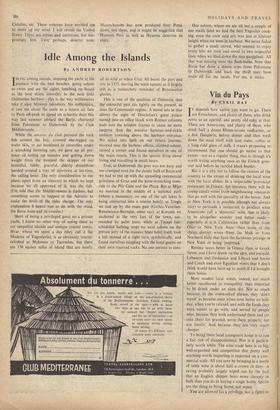Idle Among the Islands
By ANDREW ROBERTSON T DUNG among islands, stopping the yacht at the 'prettiest with the best beaches, going ashore to swim and see the sights, lunching on board as the boat skims smoothly to the next little Dalmatian harbour-701,k is the way millionaires take it. easy between ,takeovers. No millionaire, it cost me about the same as a return air fare to Paris off-peak to spend six sybaritic days this way last summer aboard the Buda,'chartered from Pakostane to DubrOvnik by the Club Mdditerrande.
While the anciens du club pursued the rock fish around the bay, zoomed one-legged on water skis, or sat becalmed in caravelles under a scorching Morning sun, we gave up all pre- tence of toning up muscles and getting down weight from the moment the skipper of our beautiful, tubby, graceful, elderly dreamboat handed around a tray of sljivovica at tea-time, the sailing hour. The only consideration in our plans, apart from an itinerary to which we kept because we all approved of it, was the tide. (I'm told that the Mediterranean is tideless; but something seems to happen in the Adriatic to make the level' of the sides chanBe. The only explanation 1 heard was' to do with the wind, the fierce bura.and its cousins.) • Short of being a privileged guest on a private yacht, I know no other way of seeing these as yet Unspoiled islands and antique coastal towns. Hvar, where we spent a day (they call it the Madeira of Yugoslavia), is as obviously tourist-' oriented as Mykonos or Taormina, but there are 130 square miles of island that are nearly all as wild as when Uluz All burnt the port and city in 1571, leaving the main square, as it largely still is, a melancholy reminder of Renaissance glories.
This is one of the qualities of Dalmatia, that the' colourful put sits lightly on the present, as does the Communist regime. A mood sets in that allows the sight of Diocletian's great palace turned into an office block with Roman columns built into the window frames to cause no more surprise than the massive hammer-and-sickle emblem towering above the harbour entrance. We sailed into Split on our return journey, moored near the harbour offices, climbed ashore, turned a corner and found ourselves- in one of the main streets. This is the special thing about living and travelling in small boats.
True, at Dubrovnik the port was too busy and too cramped even for the dainty bulk of Burja and we had to put up with the sprawling commercial griminess of Gruz and the bone-wrenching tram- ride to the Pile Gate and the Placa. But at Mljet we moored in the middle of a national park (where a .monastery on one of the salt lakes is being converted into a tourist hotel); at Trogir we tied up by the main gate (Gothic-Venetian- Renaissance-Baroque, some say); at Korgula we anchored at the very feet of the town, sur- rounded by palm trees; while at Tucepi (un- scheduled bathing stop) we went ashore on the private jetty of the massive State hotel itself, took a left instead of a right turn, symbolically, and found ourselves mingling with the hotel guests on their own reserved rocks. No one seemed to care. Our saloon, where we ate all but a couple of our meals (and we had the best Yugoslav cook- ing, even the crew said so), was just at kibitzer height when we were in harbour. We never failed to gather a small crowd, who seemed to enjoy every bite we took and stood in two respectful lines when we filed down the tiny gangplank. All that was missing were the flash-bulbs. Now that Burja has dorie a dozen trips from Pakostane to Dubrovnik 'and back the thrill may have worn off for the locals. For me, it sticks.






































 Previous page
Previous page